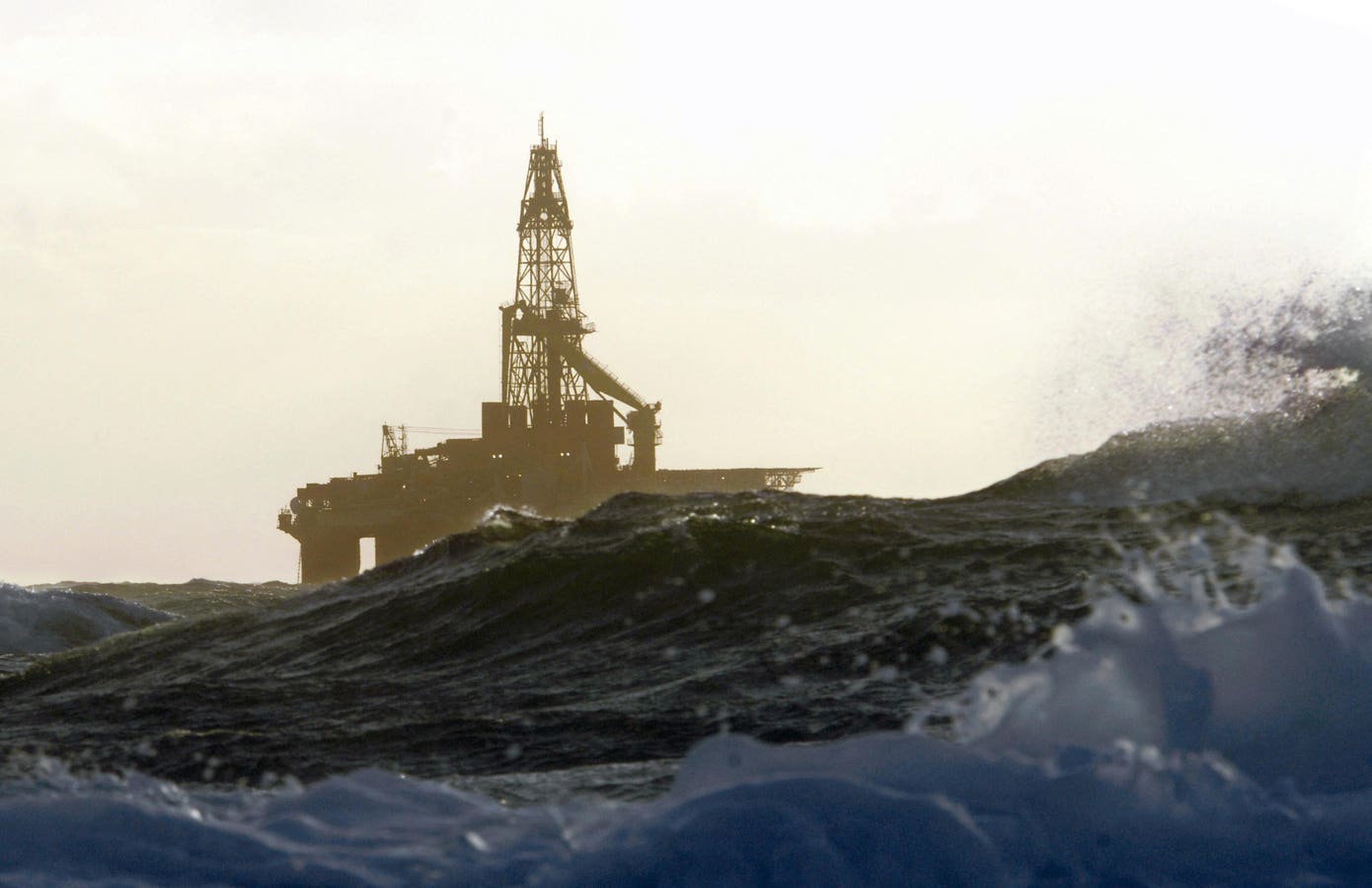
North Sea Countries Not Aligned With Climate Targets, Report Shows
POUR ILLUSTRER UNE SERIE DE TROIS PAPIERS SUR L’EXPLOITATION DU PETROLE OFFSHORE EN ANGOLA ET EN MER … [+] DE NORVEGE.Photo datée du 15 janvier 2007 d’une plateforme pétrolière durant une tempête en mer de Norvège. AFP PHOTO MARCEL MOCHET (Photo by MARCEL MOCHET / AFP) (Photo by MARCEL MOCHET/AFP via Getty Images)
AFP via Getty Images
North Sea countries are not on track to reduce production in line with the goals of the Paris Agreement to limit carbon emission, says a new analysis released by the non-profit organisation Oil Change International (OCI).
Together, the five nations producing oil and gas from the North Sea – Norway, the UK, the Netherlands, Germany, and Denmark – rank as the seventh-largest oil and gas producer in the world.
According to OCI’s policy analysts, the five countries hold the greatest economic capacity and responsibility to rapidly phase out extraction, however limited action is taken by these big energy players.
“The five major North Sea countries are at a crossroads: one path leads towards global leadership in climate action and green industries, (…). The other path leads to catastrophic climate change, economic crisis, and the loss of status as climate leaders globally(…),’ said Silje Ask Lundberg, North Sea Campaign Manager at Oil Change International.
The NGO developed a set of nine benchmarks for rating North Sea countries’ oil and gas production policies by their level of alignment with the Paris agreement.
None of the nation having access to the North Sea perform positively, with clear pathways for decarbonisation ahead of them.
Four of them benchmarks to the concrete action to phase out fossil fuels in line with 1,5 degrees, such as the intention to ending licensing.
The remaining one consist on methods on how to ensure a beneficial transition both through enacting international cooperation and aligning financial investments to this purpose.
‘The findings in this report underscore the urgent need for decisive action from North Sea governments. Failure to address these issues not only undermines international climate goals but also jeopardises the livability of our planet.” added Ask Lundberg.
Norway at the bottom
According to the ranking Norway is the country performing worst among the five, followed by the U.K.
‘We are not surprised,’ said Truels Gulowsen, Head of Norwegian section of Friends of the Earth, adding that the country is the biggest resource holder and supplier of Europe.
The lagging policies of these two nations have the biggest potential impact on total global emissions.
The potential changes in the fiscal regime in the U.K. could raise disincentives for companies to set new operation in the country, which could find even more attractive to invest in Norway.
According to Friends of the Earth Norway’s head, Norway is gambling on the fact that the EU will not be able to transition to cleaner energy sources and obtain domestic energy security.
At a Market Energy conference in Oslo organised by bank group SpareBank 1, Petroleum and Energy Minister Terje Aasland said exploration and investments in production on the Norwegian Continental Shelf (NCS), will need to continue, over the next decade, before the natural decline of resources will start.
The international Energy Association (IEA) said in 2020 that to accomplish the 1.5°c-aligned scenario, ‘there is no need for investment in new fossil fuel supply in our net zero pathway’.
New licensing for oil extractions and exploration are common within the other North Sea countries, with the Netherlands aiming to nearly double production levels between 2030 and 2045.
Renewable energy
The economic situation of the five nations not only favour them to phase out fossil fuels, but also to finance just transitions in the form of renewable energy solutions domestically.
‘In Norway there is a growing understanding that in order to take sufficient responsibility we need to limit extraction, but there is a big polarisation in the debate,’ Gulowsen said, as the energy crisis is placing the Nordic country as the primary energy supplier to the EU.
He suggests European countries will need to support the development of their own renewable energy sectors in order to make sure demands to Norway will decrease.
The country is also committed to develop its own. Petroleum and Energy Minister Aasland said that Norway will resume offshore wind concessions this year, while continuing supporting the uptake of hydropower and solar energy.


